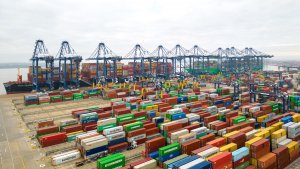When it comes to a Brexit what do entrepreneurs fear more than a shrinking economy? Uncertainty, says James Poyser.
Brexit: Why Uncertainty Is Worse Than Leaving Or Remaining
When it comes to a Brexit what do entrepreneurs fear more than a shrinking economy? Uncertainty, says James Poyser.

Car and house sales have slumped. The pound is falling. Businesses have put projects on ice. This week's news has shown that as consumers, traders and business owners we're united by a common fear: uncertainty.
Stability and certainty are not glamorous concepts. But, as entrepreneurs, when we head to the ballot boxes on Thursday we must take time to reflect on life without these seemingly mundane tenets.
Over the last few weeks I've canvassed the views of 250 independent consultants, who provide professional services across the whole of the UK economy.
You'll find them in a wide cross-section of businesses, from Amazon to the Yorkshire Building Society, and they offer a unique leading insight into the health of UK Plc. Their views can help us to understand the consequences of Brexit.
That's because they are a very good barometer of economic stability, and they directly reflect the confidence of businesses.
If we look back to 2008, consultants soon felt the pinch as businesses, faced with uncertain times ahead, put projects on hold or stopped them completely: the number of consultants dropped significantly before the recession bedded in. As risk emerged, businesses hedged their bets and eased off investment in highly skilled short-term expertise.
Conversely, as soon as the first signs of economic stability appeared, the number of consultants rose too. As businesses managed and reduced uncertainty, capital for investment once again flowed. They called in specialists to kick-start and deliver growth-yielding projects, allowing them to get a head start before the economic recovery solidified.
After the 2008 recession it took just 12 months for the consultancy market to recover. Confidence in wider economic stability was much longer coming: it took six years for general employment to recover to pre-recession levels.
That's why it's concerning to feel the winds of uncertainty blowing through the corridors of business once again. Of those 250 consultants surveyed, 23% have witnessed businesses once again slowing or stopping projects.
Even during the 2008 recession, consultants told us they were optimistic things would change. The feeling about Brexit is entirely different: the uncertainty could be paralysing for businesses.
As an entrepreneur I fear uncertainty. It comes as a surprise to many that we entrepreneurs are not risk takers. (If you're proud of your high tolerance for risk and think this will make you a successful entrepreneur, I firmly believe you'll have more success - and fun - taking your seed funding to Ascot).
The reality is that entrepreneurs despise uncertainty and risk, and we spend much of our energy removing it from decisions. And whilst we'll never have perfect knowledge, we strive to reduce risk sufficiently to rely comfortably on our judgement.
My time in China further sharpened my appreciation of the value of stability and certainty. It even kindled professional respect for red-tape and EU law, which many still believe is a barrier to business.
When doing business in China it feels like there are very few rules, and those rules that do exist are used as a weapon by those with connections in the palaces of power.
Whilst some embrace this liberating frontier, many others find the uncertainty of doing business here a terrifying prospect.
Towards the end of my time in Beijing, I had to choose between starting a business in one of the world's fastest growing, yet uncertain economies, or returning to the relative calm and predictable UK. I embraced certainty and stability, above promises of economic growth.
The red tape I encounter running my business is predictable and beneficial. It has clarified my responsibilities towards my employees. It has allowed me to safeguard our brand's trademark across 28 countries.
It's given me the confidence to invest in, and build a successful scale-up enterprise. In return we contribute to the local and national economy, and we are creating a new skilled job every 10 weeks.
It is stability and certainty that gives entrepreneurs the confidence to invest, and it's something we take as a given. It is a predictable, solid bedrock that allows businesses to start up, and to flourish.
This is exactly why Brexit poses a real dilemma to entrepreneurs. In talking to fellow business owners, regardless of their referendum intent, they all agree that Brexit will bring short to medium term uncertainty and instability.
Should the UK leave the EU, decisions to start up new ventures will be deferred until confidence returns. One in three of those surveyed believe that the uncertainty of Brexit will negatively impact them, so much so that 46% are less likely to recommend starting up following a vote to leave.
And for those of us already at the helm of growing enterprises, our finite leadership resources will be diverted to navigate the inevitable change and choppy economy, rather than investing our energies in growth and innovation.
But Brexit is not an apocalypse for business: we will survive in an independent UK. However, we must be prepared for the disruption of uncertainty and instability, and decide if a Brexit pay-off is worth the cost.
As one respondent said: "The effects of disentanglement now will certainly make for confusion in business activity in the near to long term future with an unclear and uncertain benefit".
The challenge for those championing a remain vote is that stability and certainty is precious to us all, yet is neither aspirational or exciting. Maintaining and building on a status quo does not yield great campaign slogans. It doesn't unite our animalistic responses against a tangible enemy.
But it's something we all desire. It gives consumers confidence to buy a house. It gives traders confidence to invest in the UK. It gives entrepreneurs the confidence to start up, and to scale up. But above all, it gives multi-nationals confidence in our skills, our ambition and investment value.
Thanks for signing up to Minutehack alerts.
Brilliant editorials heading your way soon.
Okay, Thanks!




